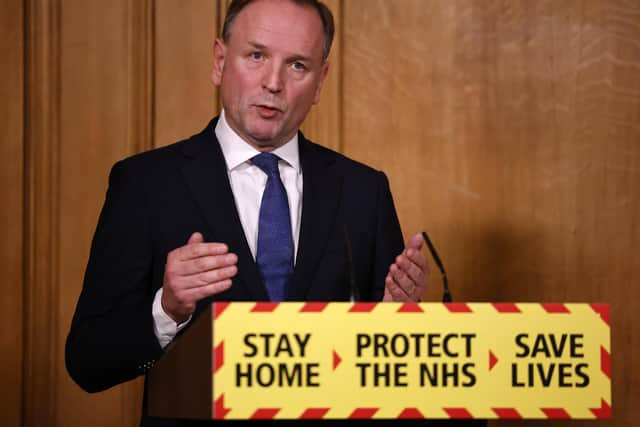NHS boss says Covid hoaxers could cause more deaths as Boris Johnson tells conspiracy theorists to 'grow up'
Sir Simon Stevens, who joined Prime Minister Boris Johnson during this evening’s coronavirus press conference from Downing Street, took a strong line against those who deny the seriousness of the virus, and said there was “nothing more demoralising” for hardworking NHS staff “than having that kind of nonsense spouted when it is most obviously untrue”.
Conspiracy theories about coronavirus have ranged from postings on social media with incorrect information about the vaccine, to crowds gathering outside hospitals to claim the virus itself is not real.
Advertisement
Hide AdAdvertisement
Hide AdMr Johnson said tonight: “On the kind of people who stand outside hospitals and say Covid is a hoax and this kind of stuff, really I do think they need to grow up.”


And Sir Simon added: “Let’s just be completely straightforward about it, when people say that, it is a lie.
“If you sneak into a hospital in an empty corridor at nine ‘o’ clock at night and film that particular corridor, and then stick it up on social media and say this proves hospitals are empty, the whole thing is a hoax, you are not only responsible for potentially changing the behaviour that will kill people, but it is an insult to the nurse coming home from 12 hours in critical care having worked her guts out under the most demanding and trying circumstances.”
It comes as a guide put together by scientists from across the world was released today to fight the spread of misinformation about the coronavirus vaccines.
Advertisement
Hide AdAdvertisement
Hide AdIn a bid to combat conspiracy theories and other misleading claims being shared on social media, the Covid-19 Vaccine Communication Handbook sets out the facts, highlighting how the vaccines are overwhelmingly safe and effective.
Co-author Professor Adam Finn, a University of Bristol virologist who has played a key role in the Covid-19 vaccine developments, said: “Accurate information about vaccines is becoming harder to distinguish from convincing but misleading fiction.
“This reduces uptake and so their impact on public health and harms us all. Although vaccines enjoy majority support that politicians can only dream of, we can no longer take this for granted.
“It’s time to take the initiative in ensuring people are not duped into making wrong decisions that harm them, their children and their communities.”
Advertisement
Hide AdAdvertisement
Hide AdTopics in the handbook include public behaviour and attitudes, policy, facts, and misinformation.
Co-author Julie Leask, a social scientist and Professor at the University of Sydney who chairs one of the World Health Organisation working groups on vaccinations, said: “The safest and most effective vaccines against Covid-19 are of no use if people cannot, or will not, take them.
“This handbook comes at a crucial time – when people around the world are deciding whether or not they will accept a Covid-19 vaccine. More than ever, we need to be communicating effectively and the handbook brings the science of communication to the communicators.”
Professor Lewandowsky added: “It’s important to challenge and debunk misinformation in a positive, constructive manner.
Advertisement
Hide AdAdvertisement
Hide Ad“I encourage people to approach this by providing a truth sandwich – start with the key facts, including that the vaccines have been shown to be 95% effective and have been comprehensively tested without cutting any corners.
“Then address the misinformation.
“For instance, if people say the vaccine can’t have been tested properly because it was developed so quickly, explain why this isn’t the case.
“Given the severity of the pandemic, more resources and expertise than ever were dedicated to this effort.
“Due to its high profile, volunteers for the trials were recruited much faster than usual.
“The Ebola vaccine effectively took 10 months from initial testing to trials in the field, so this has been done before. Then finally reiterate the facts so they stay fresh mind.”